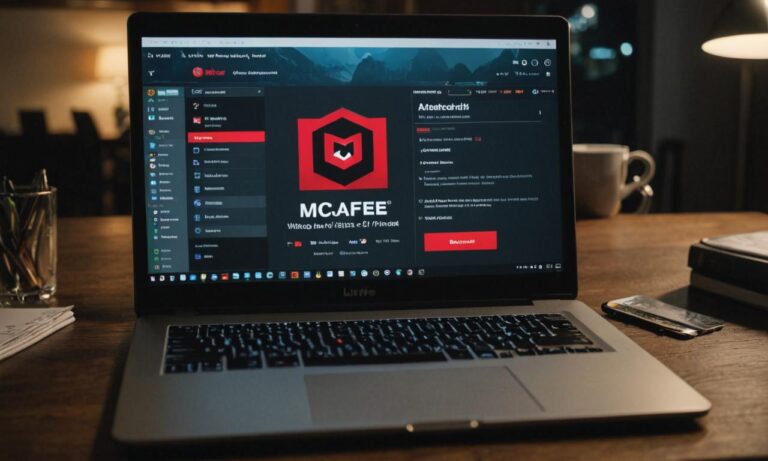In this article, learn how to protect yourself from phishing emails posing as McAfee invoices. Discover the tactics used by scammers and the consequences of falling for these scams. Find out how to report suspicious emails and stay vigilant against fraudulent communications.
As a cybersecurity professional, I have witnessed the increasing prevalence of McAfee invoice scams. These deceptive emails aim to trick unsuspecting users into revealing sensitive information or downloading malware. It is crucial to be aware of these scams and know how to identify them to protect yourself and your digital assets.
In my experience, I once received a suspicious email claiming to be from McAfee, requesting immediate payment for a subscription I had never signed up for. Upon closer inspection, I noticed discrepancies in the sender’s email address and the presence of suspicious links. This experience reinforced the importance of vigilance and skepticism when it comes to unsolicited emails.
How to Spot Phishing Emails Posing as McAfee
Phishing emails disguised as McAfee communications often exhibit specific red flags. One of the most telling signs is a mismatched sender’s email address. Scammers may use domains that closely resemble legitimate McAfee addresses but contain slight variations or typos. Always verify the sender’s email address before engaging with the message.
Another indicator of a suspicious email is the presence of urgent language or threats. Fraudulent emails may claim that your account will be suspended or that you will face legal consequences if you do not take immediate action. Legitimate companies rarely resort to such scare tactics.
Be cautious of emails containing poor grammar, spelling errors, or generic greetings. Phishing emails often lack the professionalism and attention to detail that genuine corporate communications exhibit. Trust your instincts if an email seems off or unprofessional.
Common Tactics Used in McAfee Invoice Scam Emails
Scammers employ various tactics to deceive recipients in McAfee invoice scam emails. One common approach is the use of phishing URLs or scam links. These links may appear to direct you to a legitimate McAfee website but instead lead to a fake login page designed to steal your credentials.
Phishing attacks often create a sense of urgency or scarcity to pressure you into acting quickly without thinking. They may claim that your account is overdue or that you have a limited time to respond. Be cautious of any email that demands immediate action or tries to rush your decision-making process.
Some McAfee invoice scams may include attachments or downloads that purportedly contain important information or invoices. However, these attachments may actually be malware designed to infect your device and compromise your security. Avoid opening attachments from unknown or suspicious sources.
Protecting Yourself from McAfee Impersonation Scams
To safeguard yourself against McAfee impersonation scams, adopt a skeptical mindset when encountering unsolicited emails. Do not click on links or download attachments from unknown senders, as they may lead to malicious websites or install malware on your device.
If you receive an email claiming to be from McAfee, navigate to their official website independently rather than using links provided in the email. Log in to your account directly to verify any claims made in the message.
Enable two-factor authentication on your McAfee account and other sensitive online accounts. This adds an extra layer of security, making it harder for cybercriminals to gain unauthorized access even if they obtain your password.
“Always be cautious of unsolicited emails, especially those claiming to be from well-known companies like McAfee,” advises cybersecurity expert Dr. Eliza Kasprowicz. “Scammers often exploit the trust associated with reputable brands to deceive users. Verifying the authenticity of the message through official channels is crucial.”
Consequences of Falling for a McAfee Phishing Scam
Falling victim to a McAfee phishing scam can have severe consequences. By providing sensitive information such as login credentials or financial details, you risk identity theft and unauthorized access to your accounts. Scammers may use this information to make fraudulent purchases, steal funds, or engage in other malicious activities.
Downloading malware from a phishing email can lead to device infection and compromised security. Malware can steal personal data, monitor your online activities, or even encrypt your files and demand a ransom payment.
Engaging with McAfee invoice scams can also result in financial losses. Scammers may trick you into making payments for non-existent services or subscriptions, leaving you out of pocket and without the promised benefits.
Reporting Suspicious McAfee Emails to Authorities
If you receive a suspicious email claiming to be from McAfee, it is essential to report it to the appropriate authorities. McAfee provides a dedicated email address, [email protected], where you can forward the suspicious email for investigation.
In addition to reporting the email to McAfee, you can also file a complaint with the Federal Trade Commission (FTC) or your local law enforcement agency. Providing as much information as possible, including the email headers and any attachments, can assist in investigating and combating these scams.
By reporting suspicious emails, you contribute to the collective effort to identify and shut down phishing operations, protecting yourself and others from falling victim to these scams.
Staying Vigilant: Identifying Legitimate McAfee Communications
To differentiate between legitimate McAfee communications and phishing scam emails, familiarize yourself with the company’s official communication channels. McAfee typically sends emails from domains like @mcafee.com or @e-mcafee.com. Be cautious of emails originating from unfamiliar or suspicious domains.
Legitimate McAfee emails often address you by your full name and include specific details about your account or subscriptions. Generic greetings or a lack of personalization can be red flags for phishing attempts.
If you are unsure about the authenticity of an email claiming to be from McAfee, reach out to their customer support through official channels listed on their website. They can verify the legitimacy of the communication and provide guidance on how to proceed.
In my experience, staying informed about the latest phishing tactics and maintaining a proactive approach to cybersecurity is crucial. Regularly updating your software, using strong and unique passwords, and being cautious of unsolicited emails go a long way in protecting yourself from McAfee invoice scams and other phishing attempts.
By being aware of the tactics used in McAfee invoice scams and implementing best practices for cybersecurity, you can significantly reduce the risk of falling victim to these deceptive emails. Remember, vigilance and skepticism are your best defenses against phishing attacks.
See also:
- Beware of Norton Email Scams: Protect Your Money and Personal Information
- Beware of Coinbase Scams: How to Protect Your Crypto and Avoid Phishing Attacks
- Beware the Meta Business Suite Message Scam: Don’t Fall for Fake Warning Messages
- Beware: The Latest UPS Text Scams Targeting Package Deliveries
- Beware of Instacart Scams: Protecting Customers and Shoppers






